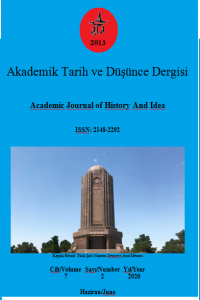Anadili Türkçe Olmayan Okul Öncesi Öğrencilerin Sınıf Uyumu İle İlgili Öğretmen Görüşleri
Bu araştırmanın amacı, anadili Türkçe olmayan okul öncesi öğrencilerin sınıf uyumu ile ilgili öğretmen görüşlerinin incelenmesidir. Nitel araştırma yönteminin kullanıldığı bu çalışmada veriler, 2020-2021 eğitim öğretim yılının bahar döneminde Diyarbakır ili merkez eğil ilçesinde ilkokul, ortaokul ve lisede görev yapan 50 öğretmenden “yarı yapılandırılmış, yönlendirici olmayan görüşme tekniği” ile elde edilmiştir. Araştırma verilerinin sunumunda temalar, kodlar kullanılmış ve bazı görüşlerden doğrudan alıntı yapılarak yorumlar desteklenmiştir. Verilerin analizinde “betimsel ve içerik” analiz yöntemleri kullanılmıştır. Araştırma bulgularına göre öğretmenler, anadili Türkçe olan öğrencilerin anadili Türkçe olmayan öğrencilere kıyasla problem çözme becerilerinin ve hayata dair günlük sorunlar karşısında çözüm üretme yeteneklerinin daha gelişmiş oldukları, Türkçeyi etkin ve güzel konuştuklarını, kendini ifade etmede bağımsız ve rahat olduklarını, duygularını doğru ifade etiklerini ve çekinmediklerini, kendine güvenlerinin daha fazla olduğunu, fiziksel etkinlikleri doğru yapmada yetkin olduklarını, psiko-motor davranışları rahatça sergilediklerini ve kalem tutma becerisinde daha başarılı olduklarını belirtmişlerdir. Bunun anadilde eğitim gören öğrencilerin akademik başarısına olumlu yönde etkilediğini vurgulamışlardır. Aynı zamanda öğretmenler anadili Türkçe olmayan öğrencilerin dil eğitimine gereken önemin verilmesi ve Türkçe konuşmalarını makul seviyelere getirilmesi için çalışmaların yapılmasını önermişlerdir.
Anahtar Kelimeler:
Anadil, Eğitim, Türkçe, Öğretmen, Öğrenci, Anadil, Eğitim, Türkçe, Öğretmen, Öğrenci, Mother tongue, Education, Turkish, Teacher, Student.
Teachers’ Opinions On Class Harmony Of Pre-School Students Whose Mother Tongue Is Not Turkish
Purpose of this research is to examine teachers’ wiews about classroom harmony of preschool students whose mother tongue is not Turkish. In this study, in which the qualitative research method was used, the data were obtained by "semi-structured, non-directive interview technique" from 50 teachers working in primary, secondary and high schools in Eğil, the central district of Diyarbakır province, in the spring term of the 2020-2021 academic year. Themes and codes were used in the presentation of the study data and comments were supported by quoting directly from some opinions. In the analysis of the data, "descriptive and content" analysis methods were used. According to the study findings, the teachers stated that the problem-solving skills of students whose mother tongue is Turkish and their ability to produce solutions in the face of daily life problems are more developed compared to the students whose mother tongue is not Turkish; that they speak Turkish effectively and well; that they are independent and comfortable in expressing themselves; that they express their emotions correctly; that they do not hesitate; that they are more self-confident, competent in performing physical activities correctly, exhibit psycho-motor behaviors easily; and that they are more successful in holding a pencil. They emphasized that this had a positive effect on the academic success of students studying in their mother tongue. At the same time, teachers suggested that necessary importance should be given to language education of students whose mother tongue is not Turkish and that studies should be carried out to bring their Turkish speaking to a reasonable level.
Keywords:
Mother tongue, Education, Turkish, Teacher, Student., Mother tongue, Education, Turkish, Teacher, Student.,
- Yayın Aralığı: Yılda 6 Sayı
- Başlangıç: 2013
- Yayıncı: Hakan YILMAZ
Sayıdaki Diğer Makaleler
Düzeltme: Rusya’da Esir Bir Yedek Subay Halil Ataman
Isparta İli Ağızlarında Damak Uyumu
Burun Üzerinden Gerçekleştirilen İkonoklazm Hareketi
Sinop’ta Geleneksel Ahşap Köy Camileri
تاثیر ادبیات و معارف قرانی در تحول معنای کلمه حبدرعصر جاهلی
Mohammad Hossein POUR MOHAMMAD
Hizb-i Cedid’in Mevadd-ı Aşere İstekleri
СУЕВЕРИЯ В РУССКОЙ ЛИНГВОКУЛЬТУРЕ
Gazneliler Sarayına Mensup Şair Ömer Osman Muhtârî-yi Gaznevî
